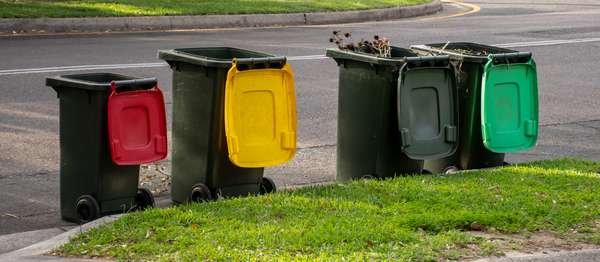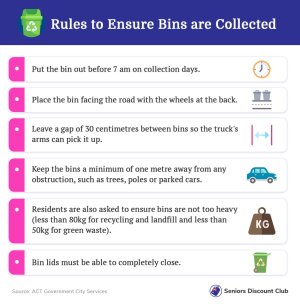Bins blocking blues: Aussie man's predicament sparks neighbourhood squabble
- Replies 13
When it comes to neighbourhood harmony, it's often the little things that can create the biggest ripples.
Take, for instance, the seemingly mundane issue of bin placement on collection day—a weekly routine that most of us don't give a second thought to
However, for one Aussie man, it's become the source of an ongoing neighbourhood dispute that's as frustrating as it is surprising.
Sachin Paudel, a resident of Ngunnawal in Canberra's north, found himself at the centre of a bin-related issue when a red Skoda with P-plates repeatedly parked in front of his bins on collection day.
The obstruction meant that the garbage trucks couldn't access his bins, leaving Paudel with uncollected waste and a written directive from the council advising him to keep his bins clear of parked cars.

‘On Tuesday night when I put my bin out, the car wasn’t there, but on Wednesday morning it was,’ Mr Paudel narrated, explaining that it wasn't a one-off incident, and had happened before.
‘The same car was parked in front of our bins when I left for work last Wednesday, and when I came back from work, there was a notice on the bin to put the bins away from the car. It said something like, “We had trouble collecting your bin, please put your bin away from cars.”’
Determined not to be caught out again, Paudel took matters into his own hands and left a note on the windshield of the offending vehicle.
‘I left a note on the car before I left for work,’ he said.
The note, captured in a photo, read: 'Please DO NOT PARK IN FRONT OF BINS!'
He also left behind the previous week's notice from the bin collectors as a stern warning.
Paudel also expressed his desire for the driver to receive a fine if they repeat parking there on bin day, particularly since there is no justification for leaving the vehicle in that location on the tranquil street.
He mentioned that he had to place his bins on the kerb in that spot, just down from his driveway, as there isn't enough space to manoeuvre his car around the bins on collection day.
Unfortunately, the situation between Paudel and his neighbour is quite unclear.
‘If the vehicle is illegally parked, it can be reported to Access Canberra who can investigate, confirm the issue, and may issue an infringement,’ an ACT Government spokesperson commented on the issue.
However, since the car is parked legally, Paudel has no recourse for having the vehicle towed or the driver fined.
Instead, the spokesperson suggested trying to resolve such issues amicably, noting that ‘often in these situations, people aren’t aware they’re causing an issue’.
‘The first step would be to reach out to the vehicle owner and express any concerns, and come to a mutual agreement,’ they advised.
‘Alternatively, the bin owner may wish to relocate their bins to the driveway for easy access for the garbage trucks.’
ACT residents are asked to follow a series of rules to ensure their bins are collected, but if these guidelines aren't met, the worst that can happen is that their rubbish remains uncollected.
The government takes an educational approach to waste management, preferring to guide residents rather than punish them for mistakes.

The frustration over bin placement and collection frequency in residential neighbourhoods is not uncommon, as evidenced by this recent dispute.
While some residents grappled with issues related to bin placement, others faced concerns about changes in their local council's waste management policies, leaving many residents feeling dissatisfied and inconvenienced.
The discontentment with council decisions regarding bin policies highlights a broader trend of community dissatisfaction with waste management practices.
 Have you ever experienced a similar 'annoying' problem that led to a dispute in your neighbourhood? How did you handle it? Did you manage to resolve it peacefully, or did it escalate? Share your stories and let's discuss them in the comments below!
Have you ever experienced a similar 'annoying' problem that led to a dispute in your neighbourhood? How did you handle it? Did you manage to resolve it peacefully, or did it escalate? Share your stories and let's discuss them in the comments below!
Take, for instance, the seemingly mundane issue of bin placement on collection day—a weekly routine that most of us don't give a second thought to
However, for one Aussie man, it's become the source of an ongoing neighbourhood dispute that's as frustrating as it is surprising.
Sachin Paudel, a resident of Ngunnawal in Canberra's north, found himself at the centre of a bin-related issue when a red Skoda with P-plates repeatedly parked in front of his bins on collection day.
The obstruction meant that the garbage trucks couldn't access his bins, leaving Paudel with uncollected waste and a written directive from the council advising him to keep his bins clear of parked cars.

Sachin Paudel expressed his frustration over a parked car repeatedly obstructing his bins on collection day. Credits: Shutterstock
‘On Tuesday night when I put my bin out, the car wasn’t there, but on Wednesday morning it was,’ Mr Paudel narrated, explaining that it wasn't a one-off incident, and had happened before.
‘The same car was parked in front of our bins when I left for work last Wednesday, and when I came back from work, there was a notice on the bin to put the bins away from the car. It said something like, “We had trouble collecting your bin, please put your bin away from cars.”’
Determined not to be caught out again, Paudel took matters into his own hands and left a note on the windshield of the offending vehicle.
‘I left a note on the car before I left for work,’ he said.
The note, captured in a photo, read: 'Please DO NOT PARK IN FRONT OF BINS!'
He also left behind the previous week's notice from the bin collectors as a stern warning.
Paudel also expressed his desire for the driver to receive a fine if they repeat parking there on bin day, particularly since there is no justification for leaving the vehicle in that location on the tranquil street.
He mentioned that he had to place his bins on the kerb in that spot, just down from his driveway, as there isn't enough space to manoeuvre his car around the bins on collection day.
Unfortunately, the situation between Paudel and his neighbour is quite unclear.
‘If the vehicle is illegally parked, it can be reported to Access Canberra who can investigate, confirm the issue, and may issue an infringement,’ an ACT Government spokesperson commented on the issue.
However, since the car is parked legally, Paudel has no recourse for having the vehicle towed or the driver fined.
Instead, the spokesperson suggested trying to resolve such issues amicably, noting that ‘often in these situations, people aren’t aware they’re causing an issue’.
‘The first step would be to reach out to the vehicle owner and express any concerns, and come to a mutual agreement,’ they advised.
‘Alternatively, the bin owner may wish to relocate their bins to the driveway for easy access for the garbage trucks.’
ACT residents are asked to follow a series of rules to ensure their bins are collected, but if these guidelines aren't met, the worst that can happen is that their rubbish remains uncollected.
The government takes an educational approach to waste management, preferring to guide residents rather than punish them for mistakes.

The frustration over bin placement and collection frequency in residential neighbourhoods is not uncommon, as evidenced by this recent dispute.
While some residents grappled with issues related to bin placement, others faced concerns about changes in their local council's waste management policies, leaving many residents feeling dissatisfied and inconvenienced.
The discontentment with council decisions regarding bin policies highlights a broader trend of community dissatisfaction with waste management practices.
Key Takeaways
- An Australian man has experienced recurring issues with a parked car obstructing his bins on bin collection day in Canberra's suburb of Ngunnawal.
- Despite leaving notes and receiving a written directive from the council, the man's bins were again blocked by the same car, leading to the bin collectors leaving a notice.
- The ACT government spokesperson suggested resolving the issue personally with the vehicle owner, as the car is not parked illegally and therefore can't be fined or towed.
- The ACT government's stance on household waste management emphasised education over punishment, not fining residents for contamination but rather providing information and guidance.







